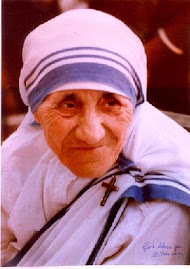
What does this mean for each of us in our daily lives?
As Christians we believe that the Gospel of Jesus Christ is a "Gospel of life." It invites all persons and societies to a new life lived abundantly in respect for human dignity. (Living the Gospel of Life)
Central to the principle of human dignity is the understanding that, every human being is created in the image of God, redeemed by Jesus Christ, destined for union with God, and therefore worthy of respect as a member of the human family.
The Catechism of the Catholic Church (a summary and expansion of Scriptures) tells us this:
1718. In what is the dignity of the human person rooted? (CCC 1700)
The dignity of the human person is rooted in man’s creation in the image and likeness of God.
1719. Where is the dignity of the human person fulfilled? (CCC 1700)
The dignity of the human person is fulfilled in his vocation to divine beatitude.
1720. How is the dignity of the human person fulfilled on the part of man? (CCC 1700)
The dignity of the human person is fulfilled on the part of man through:
1. performing free human acts
2. conforming to moral conscience
3. growing in virtue
4. avoiding sin.
If we do not value the life of each human person, then it's difficult to work for social justice.
Second, we need to define social justice.
In order to define social justice, let us begin, by taking a look at what social ministry is:
Social Ministry has two main aspects: social service (also known as Parish Outreach) and social action
Social Service is giving direct aid to someone in need. It usually involves performing one or more of the corporal works of mercy. That is, giving alms to the poor, feeding the hungry, clothing the naked, visiting the sick or imprisoned, taking care of orphans and widows, visiting the shut-ins etc. Another name for it is charity.
Social Action is correcting the structures that perpetuate the need. Another name for this is Social Justice. Through the lens of social justice, we begin to take a look at the problems and issues facing us in our own communities, the nation and finally the world, and we begin to ask questions such as,
"Why is there so much unemployment in our area?"
"Why are there so many poor in our community?"
"How will the deforestation of our rain forests affect our global climate?" etc...
Very often when you are performing social service, you also become involved in solving the problem which created the need in the first place, and the two are closely related and often blend together. An example of this would be, someone comes to your food pantry, and tells you he/she has no food, because he/she lost their job recently. You may know of an employer looking to hire someone right away for a job requiring little or no skills. You give that person food, then place that person in touch with the employer.
You then would have solved both problems for that person. (a) the immediate need of food through an act of charity (social service) and (b) you would have corrected the problem which created and perpetuated the need. (social justice)
Sciptural references for our human identity:
We are all One Body in Christ -1Cor 12:12
Together we are Christ's Body, each of us a different part -1Cor 12:27
All are one in Christ -Gal 3:28
"I am the Vine, you are the branches.." -John 15:1-5
You are God's temple. -1Cor 3:16
Vatican II document: "Constitution on the Church" Chapter 1 states that the Church is:
#1. A sign and instrument in the world.
#3. The Kingdom of Christ here on earth.
#7. All of us are to use our gifts to serve one another.
#9. Not as individuals are we called to be saved, but as One Body.
Then, what should we do? What is our mission as Christians?
Jesus begins His ministry of bringing the Good News to the poor. -Luke 4:16-19
At the Last Judgement Christ will seperate the sheep from the goats. -Matt 25:31-46
You are the Salt of the Earth. -Matt 5:3-16
Blessed are the Peacemakers, for they shall be called children of God. -Matt 5:6-9
The goals of social justice and church outreach are the same: To follow the command to "love one another as I have loved you".
To enable everyone to enter into a relationship with Christ in such a way, so that everyone can come to know Christ in the same way that the Father knows the Son.
If we think about this for a moment, it becomes clear. If our basic human needs are met, that is to say that if we are not concerned with obtaining food, clothing, shelter etc., then we are better able to enter into a closer relationship with Christ.
So, we step out to serve lunch in Veteran's Park each Saturday, but our vision is much broader than the food. We offer ourselves - our desires, our gifts - in God's hands and pray that He transforms our offering and transforms those who are served to seek after Him.
We ask to look through Christ's eyes to see the dignity and value in each person we meet - just as Christ does.
There are many facets involved. Yet if we focus on human dignity, work for social justice, and open the eyes of our hearts, then our Lord will lead each of us (with our individual gifts) down the right path and take care of the details of those in need.
We need to pray for peace, trust in God's omnipotent plan and take action - TOGETHER.
This means we must collaborate as the body of Christ and with those of different faiths, as well. There is strength in unity.
Almighty and eternal God, may Your grace enkindle in all of us a love for the many unfortunate people whom poverty and misery reduce to a condition of life unworthy of human beings.
Arouse in the hearts of those who call You Father a hunger and thirst for social justice and for fraternal charity in deeds and in truth.
Grant, O Lord, peace to souls, peace to families, peace to our country and peace among nations. Amen.







